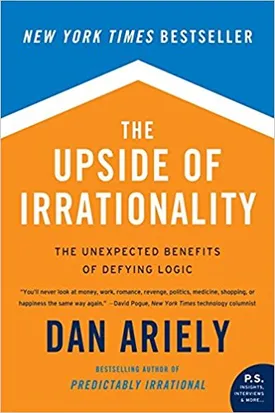The Upside of Irrationality: The Unexpected Benefits of Defying Logic by Dan Ariely
In his book, “The Upside of Irrationality: The Unexpected Benefits of Defying Logic”, world-renowned behavioral economist and NY Times bestselling author Dan Ariely urges readers to reconsider their view of irrationality. Through his signature blend of scientific research and personal anecdotes, Ariely makes a powerful case for why irrationality – properly leveraged – can lead to superior outcomes.
The book opens by introducing the concept of systematic irrationality – the tendency for humans to behave irrationally at predictable times, in a predictable way. It goes on to identify five domains in which irrational behavior is often displayed: perception of risk, failure to control desires, strange numerical evaluations, failure to learn from experience, and misreading the social world. In each of these five domains, Ariely explains how mainstream economic models fail to fully account for how humans actually behave.
One example Ariely uses to illustrate this “forgetting to learn from experience” is his own failed resolutions to quit smoking. While the standard economic theory of “rational expectations” implies he should learn from past experiences and quit, Ariely never did. He argues that in reality, we humans tend to selectively block out negative experiences – we can “know” something is bad for us, and still not do anything about it.
To make his point here, Ariely cites other similar examples from the literature such as a study of MBA students in which 58% said that they had had bad past experiences with alcohol and still continued to drink. This and other data allow Ariely to describe how we humans tend to ignore the potential harm of irrational behavior.
The idea underlying “The Upside of Irrationality” is that, properly leveraged, irrationality can actually be a boon in some cases. To support his case, Ariely notes how some of the most successful companies and entrepreneurs – Apple, Berkshire Hathaway, and Warren Buffett, among others – have defied rational expectations in their business decisions. Likewise, by studying how different countries have responded to the EU debt crisis, Ariely uncovers examples of what he terms “strategic irrationality” and “strategic myopia”, where countries have made shortsighted, excessively optimistic choices that have actually paid off for them.
The principles in this book go far beyond discussions of economics. For example, Ariely suggests that irrational behavior can be put to good use to create meaningful relationships. He makes the case that partners should even be encouraged to be irrational – since doing so can foster trust and cultivate a stronger connection. He further explains how by focusing on some of the irrational behaviors of our significant other, we can further strengthen our relationships.
In addition to these topics, “The Upside of Irrationality” also offers practical advice and tips on how to put irrationality to work in everyday life – from how to think more productively under pressure, to how to make better decisions in our businesses and investments.
Overall, “The Upside of Irrationality” offers a refreshing take on irrationality. Whether it’s in our personal relationships or in business, Ariely challenges us to reconsider our view of irrationality. By mixing real-world anecdotes with scientific insights, Ariely shows how imperfect humans can still come out on top – and why, sometimes, ignoring logic is exactly what it takes for them to do it.

